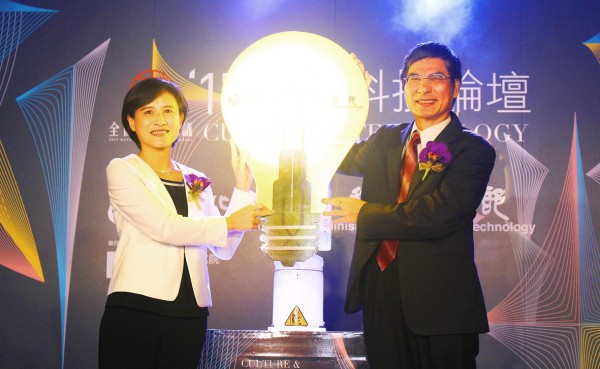《TAIPEI TIMES》 Digital future for Aboriginal culture

Minister of Culture Cheng Li-chiun, left, and Minister of Science and Technology Chen Liang-gee hold a model of a lit light bulb to mark the launch of the Culture and Technology forum in Taipei yesterday. Photo: CNA
By Lin Chia-nan / Staff reporter
The Ministry of Culture and the Ministry of Science and Technology are to launch a joint effort to promote the digitalization of Aboriginal cultures, Minister of Culture Cheng Li-chiun (鄭麗君) said yesterday, adding that they want to produce content.
At a forum in Huashan 1914 Creative Park in Taipei yesterday, Cheng invited the Minister of Science and Technology Chen Liang-gee (陳良基) to develop a framework for cultural and technological policy.
“In the framework, the science and technology ministry will supply the tools,” Chen said, adding their key objectives are promoting the digitalization and internalization of the nations cultures.
While digital technology is a challenge and an opportunity for established cultures, the new framework is to encompass such issues as digital economy, cultural finance and mass communication, Cheng said.
A joint team is to be established for closer interaction, the ministers said.
Asked about how the budget would be allocated, Cheng said the government’s Forward-looking Infrastructure Development Program has incorporated some of the ministry’s plans to develop a database for national cultural memory and to produce digital content based on the nation’s Aboriginal cultures.
The culture ministry plans to transform a former air force base in Taipei into a cultural laboratory that allows trials of culture-related projects, she said.
The renovation of the base is to start next year and is expected to take six years to complete, Cheng said, adding that the ministry intends to promote artistic activities at the facility.
In response to growing calls for a public Hoklo (also known as Taiwanese) TV channel, Cheng said the ministry would have it set up using funds in next year’s budget and would propose an amendment to the Public Television Act (公共電視法).
While the ministry is working on a draft national language development bill, some people attending the last public hearing on the bill in Taipei on Sunday, demanded that it abolish Chinese phonetic symbols.
Cheng said it is not possible to abolish the system
“Every language is beautiful. Languages themselves have no wrongs. It is the past unitary language policy that needs rectification,” she said.
“We hope the Ministry of Education can establish some reference standards for writing systems, but we will not exclude any extant writing systems,” she said, adding the bill would pay more attention to the languages at risk of extinction, including Taiwanese Sign Language.
新聞來源:TAIPEI TIMES



















